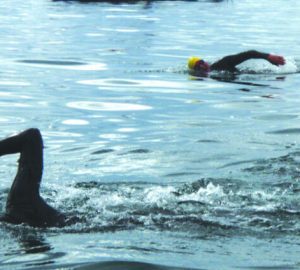
How to cope with life when you can’t swim
My working assumption is that everyone has bad stuff in their lives to deal with: traumatic events in the past, difficult issues to manage in the present and worries about what the future holds.
Swimming can’t solve life’s hard problems. It doesn’t cure illness nor (except for a few lucky people) pay the mortgage. But what it does do very well, is to help us cope with some of the sh*t that life throws at us. Something magical happens when you’re in the water, especially when it’s outside, in nature. Swimming changes your thinking and attitude. And given that much of the bad stuff that happens in life is beyond our control, often the only thing we can change is the way we think about it.
The coronavirus pandemic is giving us endless reasons to worry and, at the same time, for many of us, has stopped us swimming and hence blocked access to one of the main ways we use to alleviate stress. How we can cope with life’s bad stuff, as well as the additional burden of coronavirus-induced stress, without swimming? Let’s look at how swimming helps and what the alternatives might be.
1. Swimming can break a cycle of negative thinking
When you have something to worry about, you can get stuck in an endless cycle of negative thinking that prevents you from moving on. Going for a swim forces you to think about, well, swimming. The effect is bigger with swimming outside in cool water. That respite from a negative-thinking cycle can be a complete mood changer.
Alternatives. Running or walking can help, although I don’t find them as effective as swimming. You could also try imagining yourself swimming. Not just visualising it, but sensing it as completely as you can: how the water feels on your skin, the sensation of movement, the smell, taste and sound. If you live close enough to a body of water, even a duck pond, perhaps go and sit next to it for a few moments (while maintaining appropriate physical distance from other people, of course) while doing this.
2. Swimming helps you relax
Swimming is calming and meditative. For me, that’s a result of the combination of rhythmic movement, exercise at the right level of intensity, combined with the partial suppression of vision and sound and enhanced awareness of your body.
Alternatives. Some people recommend yoga. I’m not competent enough in yoga to be able to relax in the same way I can with swimming, but I get the point. Walking and running, again, can help, but I find walking not quite energetic enough and running slightly too tiring. Also, neither are distracting enough mentally, in the same way swimming is, to give my brain a good break. Could now be the time to start learning to play that musical instrument you’ve always wanted to? There’s definitely something relaxing about making music.
3. Swimming is your social life
Sad but true. Most of my friends are swimmers, and I miss them. I miss the banter from training, the stories gasped out in episodes on rest breaks, and the coffee and cake afterwards.
Alternatives. Zoom, Facebook and WhatsApp or even a phone call (it’s true, some people still use their phones for phone calls). It’s not the same but it can be quite fun to video chat with people who you normally only see wearing a cap and goggles. Send text messages to people you swim with to check they’re doing OK.

Lucky ducklings. At least they can swim undisturbed for now.
4. Swimming boosts your confidence
Stepping into cold water, completing a tough training set or doing a long distance swim all require overcoming discomfort or even fear. These small wins, perhaps on a daily or weekly basis, give you reassurance of your competence and mental strength that you can carry into your working day, and that helps you take on non-swimming related challenges.
Alternatives. Set yourself some mini challenges. For example, time how long you can hold a plank for, and set yourself a target to double that time in a week. Or try learning a new skill, such as juggling, or following a complicated recipe to make a meal you’ve never had before. And keep reminding yourself of all those successes you’ve had in swimming.
5. Swimming is part of your identity
If you’re a regular swimming, you’re probably, literally, shaped by the water in some way. If you’re frequently in the pool, then swimming may have changed the way you smell. The rhythms of your days, weeks and years are most likely defined by when and where you swim. Being a swimmer is a big part of who you are so not being able to swim challenges how you think of yourself.
Alternatives: Remember, you don’t stop being a swimmer just because you’re prevented from swimming. Think about what you can do now that connects you to swimming. How about all those core exercises you know you’re supposed to do but don’t normally have the time? And those shoulder strengthening ones? Remember to work on your flexibility too. Now may also be a good time to read those swimming related books you’ve always wanted to, or watch a swimming-themed film.








